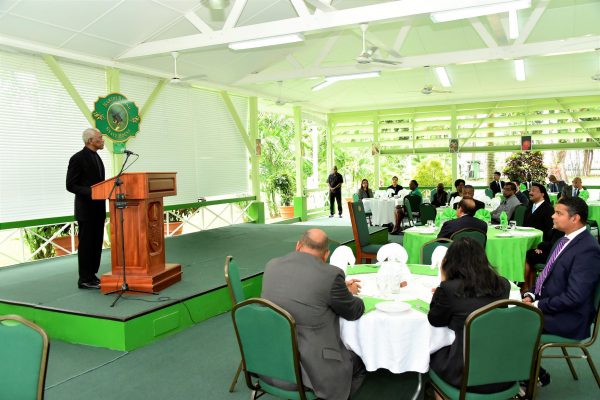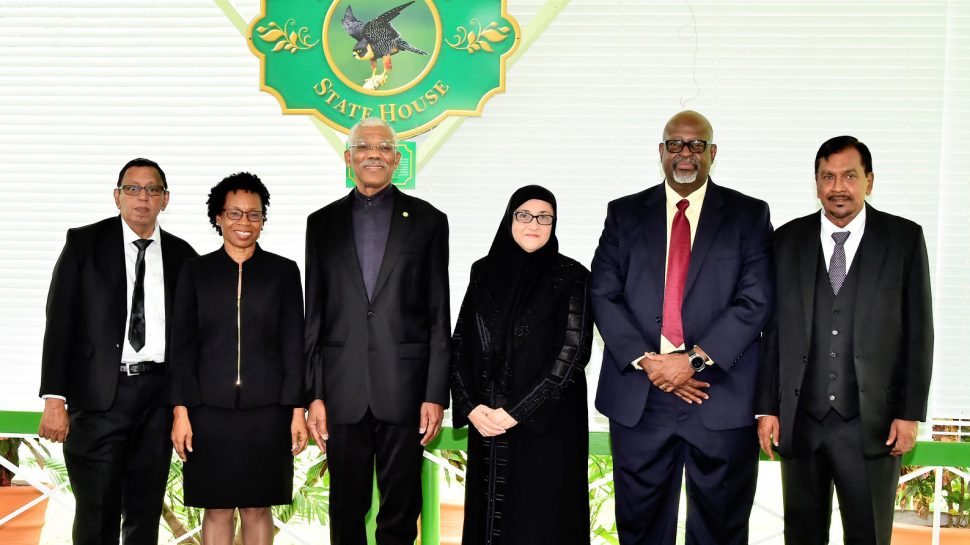The five attorneys who were elevated to Senior Counsel on January 1, 2019 yesterday received their instruments of appointment from President David Granger, who stressed that this title is not “a personal favour or a political reward.”
Director of Public Prosecutions (DPP) Shalimar Ali-Hack, Stephen Fraser, Carole James-Boston, Robert Ramcharran and Rajendra Nath Poonai were treated to lunch at the Baridi Benab, State House following a short ceremony.
In his address, the President said “the parchment with which you have been presented may fade with age but the honour which it represents will fortify your profession. Your preferment will enrich your practice with the passage of time. Public approbation will strengthen public trust and confidence in the legal system. Silk may become threadbare but scholarship will never perish.”

He told the audience which included members of the Inner Bar, that the conferral of the SC title is a proud tradition reserved for members of an honourable profession who have distinguished themselves as being ‘…learned in the law.’
Granger explained that this honour, historically, has been bestowed in some jurisdictions for more than four centuries, beginning in 1597 when the first person was appointed Queen’s Counsel by the sovereign – the Queen of England and Ireland.
The title accorded prestige and privileges to its awardees. Queen’s Coun-sel and King’s Counsel, initially, functioned as legal advisers to the sovereign, who enjoyed precedence in court, were inducted into the Inner Bar and were entitled to all the benefits which such status attracted and to be robed in silk of a special design, he said.
The title was adopted by many of the British Colonies, Dominions and Commonwealth states. It was rebranded in many Commonwealth Republics as Senior Counsel, Senior Advocate, State Counsel or President’s Counsel.
The conferral of the honour, traditionally, was exclusively a royal prerogative. The authority for making such honours is vested, almost invariably, in Heads of State, he said while noting that the Constitution and laws of Guyana do not prescribe how Senior Counsel are to be appointed. The prerogative of preferment in this Republic is reposed, by practice, exclusively in the President.
He stressed that the title is conferred on the basis of merit and is “uncontaminated by arbitrariness or capriciousness.” He said that the quintet deserve the designation of Senior Counsel by virtue of their erudition, experience and expertise.
The honour of Senior Counsel though not formally a part of the national honours system – which is governed by its own Constitution of the Orders of Guyana “is a national symbol, alongside other national symbols. The honour of Senior Counsel defines our national identity and is a professional badge that distinguishes attorneys of erudition, experience and expertise.”
Further, he said that the President is the trustee of the traditions which sustain society. As such, Granger said that it is his obligation, not an option, to respect our national honours system; his duty to pay respect to those to whom respect is due; my duty to promote greater respect for our legal system and my duty to ensure that the conferment of the title of Senior Counsel would be made annually with regularity and consistency.
“Failure to confer these awards would constitute a dereliction of these duties,” he said, adding that this ceremony must remain a convention of good government and be part of the culture of a good society.
“The conferral of the honour of Senior Counsel has become balanced. Three women who are ‘…learned in the law.’ were conferred with the title in 2017 – the first time in our history that women were so recognized. Another outstanding female attorney-at law was appointed a Senior Counsel last year. This year we honour two eminent female members of the profession,” he said.
Granger made a promise that the conferral of this honour “will not lapse under my Presidency.”
He reminded that the award, prior to its re-introduction in January 2017, was conferred rarely and irregularly in the preceding three decades but has now become annual.






